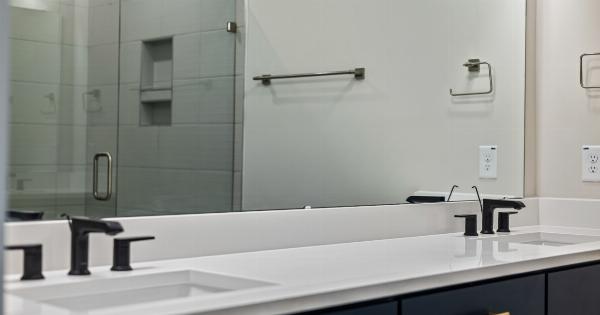Showering is an essential part of our daily routine. It not only helps us maintain personal hygiene but also offers a refreshing and revitalizing experience. However, the frequency of showering can often be a topic of debate.
Some people prefer to shower every day, while others find it sufficient to shower every other day. But is showering every other day okay?.
Understanding skin and its needs
Before we delve into the question, it is important to understand the basic needs of our skin. The skin is the largest organ in our body and acts as a protective barrier against external factors.
It plays a crucial role in maintaining body temperature and preventing the entry of harmful bacteria and viruses.
Our skin also has its own ecosystem of natural oils and beneficial bacteria, which help keep it healthy. These natural oils keep the skin moisturized, prevent dryness, and protect it from damage.
However, excessive washing can strip away these natural oils, leading to dry, irritated, and sensitive skin.
The importance of personal hygiene
Personal hygiene is critical for overall health and well-being. Regular bathing helps remove dirt, sweat, bacteria, and dead skin cells from our body. It also prevents body odor and reduces the risk of infections.
Maintaining good personal hygiene is particularly important for individuals with certain medical conditions, such as acne or excessive sweating.
Factors to consider
While showering every day may seem like the norm, it may not be necessary for everyone. Several factors should be considered when deciding how frequently to shower:.
1. Skin type
Each individual has a unique skin type, ranging from dry to oily. People with dry skin tend to produce less natural oils and may require less frequent showers to prevent their skin from becoming excessively dry.
On the other hand, individuals with oily skin may feel the need to shower more frequently, as excess sebum production can lead to clogged pores and acne.
2. Level of physical activity
Individuals who engage in regular physical activity, exercise, or sport may need to shower more frequently to wash away sweat and odor-causing bacteria.
Sweating is the body’s way of cooling down, and improper hygiene practices can result in body odor and skin infections.
3. Climatic conditions
The climate in which one lives also plays a role in determining shower frequency. In hot and humid climates, where individuals tend to sweat more, daily showers may be necessary to prevent skin infections and discomfort.
In contrast, in colder and drier climates, showering every other day may be sufficient to maintain personal hygiene without excessively drying out the skin.
4. Allergies and skin conditions
People with allergies or certain skin conditions may need to shower more frequently to remove allergens or to prevent irritation and itching.
Conditions like eczema or psoriasis may require specific bathing routines as recommended by healthcare professionals. It is essential to consult with a dermatologist or healthcare provider if you have any skin concerns.
Benefits of showering every other day
Showering every other day can offer some benefits for individuals who do not require daily showers:.
1. Preserves natural oils
When we shower every day, we often strip away the natural oils that keep our skin moisturized and protected. By showering every other day, we allow our skin to replenish these oils, resulting in healthier and more balanced skin.
2. Reduces water consumption
Water is a precious resource, and by showering every other day instead of daily, we can help conserve water. Conserving water is not only environmentally friendly but also reduces water bills.
3. Saves time
Showering every other day can save valuable time, especially for individuals with busy schedules. It allows for more flexibility and can be beneficial for those who struggle to find time for self-care amidst their daily routine.
How to maintain personal hygiene when showering every other day?
If you have decided to shower every other day, it is still important to practice good personal hygiene. Here are some tips to maintain cleanliness and freshness:.
1. Focus on key areas
Even if you are not taking a full shower, paying attention to essential areas like the armpits, groin, and feet can help remove sweat, bacteria, and prevent body odor.
Using a washcloth or wet wipes can be helpful in cleaning these areas in between showers.
2. Use mild soaps
When you do shower, opt for mild, fragrance-free soaps. Harsh soaps can further strip away natural oils and dry out the skin. Look for products that are gentle on the skin and do not contain any potential irritants.
3. Rinse well
Ensure you rinse your body thoroughly to remove any soap residue and sweat. Leaving behind soap residues can lead to skin irritation and dryness.
4. Moisturize
After showering or bathing, it is crucial to moisturize your skin to lock in moisture and prevent dryness. Choose a moisturizer suitable for your skin type and apply it generously, especially to areas prone to dryness.
5. Clean clothing and accessories
Regularly washing and changing clothing, especially undergarments and socks, is important to maintain personal hygiene. Clean clothes help prevent the growth of bacteria and minimize body odor.
Balancing personal preferences and hygiene needs
Ultimately, the frequency of showering is a personal choice that should be based on individual needs and preferences. While some individuals may feel refreshed and clean with daily showers, others may find it unnecessary and even harmful to their skin.
It is important to strike a balance between personal hygiene and the need to maintain healthy skin.
Observing good personal hygiene practices, such as regular hand washing, brushing teeth, and keeping key areas clean, is crucial regardless of shower frequency.
Conclusion
Showering every other day can be a suitable option for individuals who do not require daily showers. It helps preserve natural oils, reduces water consumption, and saves time.
However, personal hygiene should never be compromised, and individuals should practice cleanliness and pay attention to key areas in between showers. Consulting with a healthcare professional or dermatologist can provide further guidance based on specific skin conditions and individual needs.






























